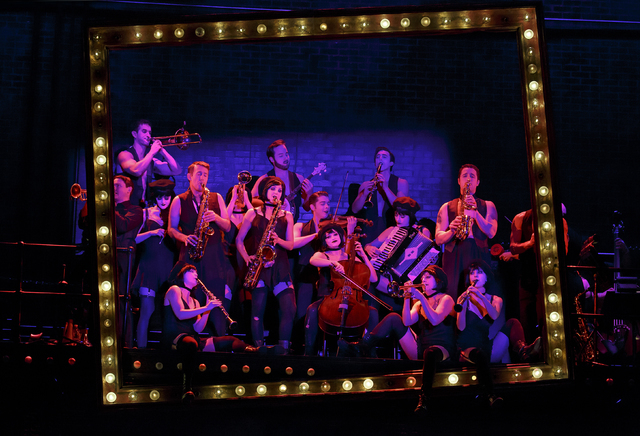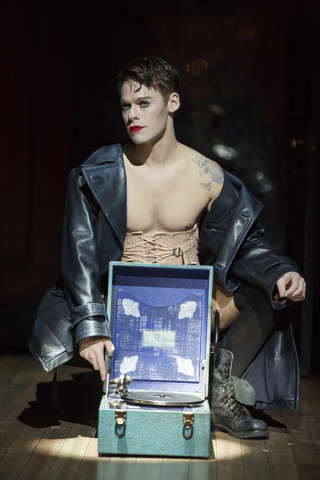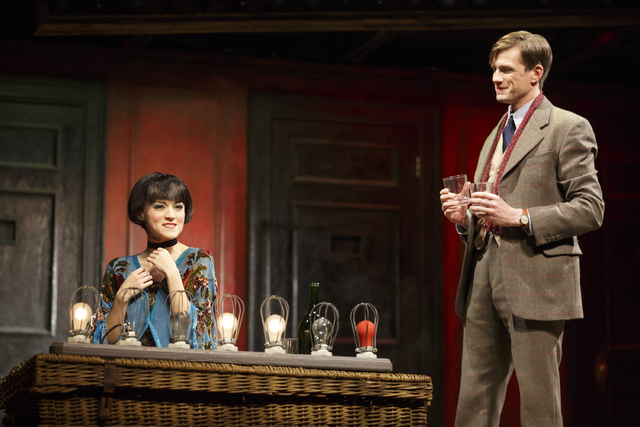Tony winner ‘Cabaret’ still timeless, and timely, at 50






Some 50-year-old musicals need a face-lift — and can’t hide the scars when they get one.
But “Cabaret” never seems to show its age.
Or perhaps, human nature being what it is, “Cabaret” remains not only timeless but timely, no matter when you see it.
Either way, Smith Center audiences will have the chance to come to the “Cabaret” when the Tony-winning best musical of 1966-67 — and the Tony-winning best musical revival of 1998 — comes to Reynolds Hall on Tuesday for an eight-performance run.
The latter production, directed by “American Beauty” Oscar winner Sam Mendes and co-director/choreographer Rob Marshall (“Into the Woods,” “Chicago”) inspired a 2014 revival — which in turn inspired the current tour, presented by New York’s Roundabout Theatre Company as part of its 50th anniversary.
The touring production’s director, BT McNicholl, has been associated with this incarnation of “Cabaret” for about 17 years, “on and off, mostly on.”
But librettist Joe Masteroff has been there from the beginning — before “Cabaret” first hit the stage with its daring depiction of a divinely decadent pre-World War II Berlin on a collision course with the rising National Socialist Party, better known as the Nazis.
Based on Christopher Isherwood’s 1939 novella “Goodbye to Berlin” — which John Van Druten first adapted as the play “I Am a Camera” — “Cabaret” in the beginning was “an interesting show,” Masteroff recalls in a telephone interview from New York.
“Audiences seemed to enjoy it, which we didn’t expect at all,” he notes. After all, “Cabaret” addresses “things you don’t talk about in Broadway musicals.”
Consider “Cabaret” leading lady Sally Bowles (played in the current tour by Andrea Goss), the pretty, gritty Kit Kat Klub chanteuse who — SPOILER ALERT! — undergoes an abortion. Or Sally’s romantic interest, writer Clifford Bradshaw (Lee Aaron Rosen), who wrestles with his sexuality.
And, speaking of sexuality, let’s hear it for the Kit Kat Klub’s gleefully androgynous Master of Ceremonies (played by “Queer as Folk’s” Randy Harrison). Decked out in suggestively arranged suspenders, the Emcee bids audiences “Wilkommen,” inviting them to “Leave your troubles outside. So life is disappointing — forget it. In here, life is beautiful.”
Depending on your point of view, that is. In another number, “If You Could See Her Through My Eyes,” the Emcee serenades a performer in a gorilla suit, lovingly singing “If you could see her through my eyes, she wouldn’t look Jewish at all.”
Back in 1966, “you can’t put that in,” Masteroff says. So, in the original production, composers John Kander and Fred Ebb replaced the word “Jewish” with “meeskite” — Yiddish for ugly — which provided the title of another musical number.
“Meeskite,” along with many other songs from the Broadway original, never made it into “Cabaret’s” 1972 screen adaptation, in part because director Bob Fosse (who won an Oscar for the movie) “didn’t think the function of musical theater was to do unpleasant things,” Masteroff notes. “He was against everything that we were doing.”
Everything that “Cabaret’s” creators did, in the beginning, “did shock people,” Masteroff acknowledges. “At the first production, in Boston, audiences walked out in droves. They didn’t know what they were in for.”
Audiences “were not ready” for a show that featured “Nazis and swastikas,” original director Hal Prince told Smith Center audiences in a 2015 talk. But, Prince added, “controversy is the meat and potatoes of theater.”
A half-century later, “Cabaret” may not be so controversial, considering everything that’s happened since its debut.
Though “the world keeps changing, it’s astonishing to me how current the show is,” observes McNicholl, who’s staged “Cabaret” from Paris and Madrid to Sydney and Seoul, South Korea.
Indeed, some of the show’s “dialogue gets applause,” because the lines seem to be “plucked from today’s headlines, McNicholl notes.
He cites an exchange between two characters who never made it into the movie: Sally and Cliff’s landlady Fraulein Schneider (Shannon Cochran) and her suitor, Jewish shop owner Herr Schultz (Mark Nelson). She’s hesitant to accept his proposal, fearing the Nazis’ rise to power, which prompts him to suggest she “wait ’til the next election and then decide.”
With the next U.S. election only months away, a musical focusing on “a society trying to marginalize one ethnic group, one religious group” seems especially timely, McNicholl suggests.
But this musical “is not taking a side,” he adds. “This is the discussion. And, what’s more to the point — with song and dance and sexy numbers — we show how that happens and how we become complicit.”
In short, “this is not your grandmother’s ‘Cabaret,’ ” he says. “Good musicals are subversive — you go along for the ride and you’re so entertained, you can’t resist.”
Back in the ’60s, when “Cabaret” first hit Broadway, “we did feel very brave,” says Masteroff, now 96 — and currently basking in rave reviews for the latest Broadway revival of “She Loves Me,” a previous collaboration with Prince.
During “Cabaret’s” initial run, “we did feel very brave, but I was scared to death. The audience could have resisted it,” Masteroff says.
All these decades later, it’s clear that audiences still find “Cabaret” irresistible.
“It really makes you sit there,” Masteroff says, “and it makes you listen.”
Read more from Carol Cling at reviewjournal.com. Contact her at ccling@reviewjournal.com and follow @CarolSCling on Twitter.
Preview
What: “Cabaret”
When: 7:30 p.m. Tuesday-June 16; also 7:30 p.m. June 17, 2 and 7:30 p.m. June 18-19
Where: Reynolds Hall, The Smith Center for the Performing Arts, 361 Symphony Park Ave.
Tickets: $29-$129 (702-749-2000, www.thesmithcenter.com)


















